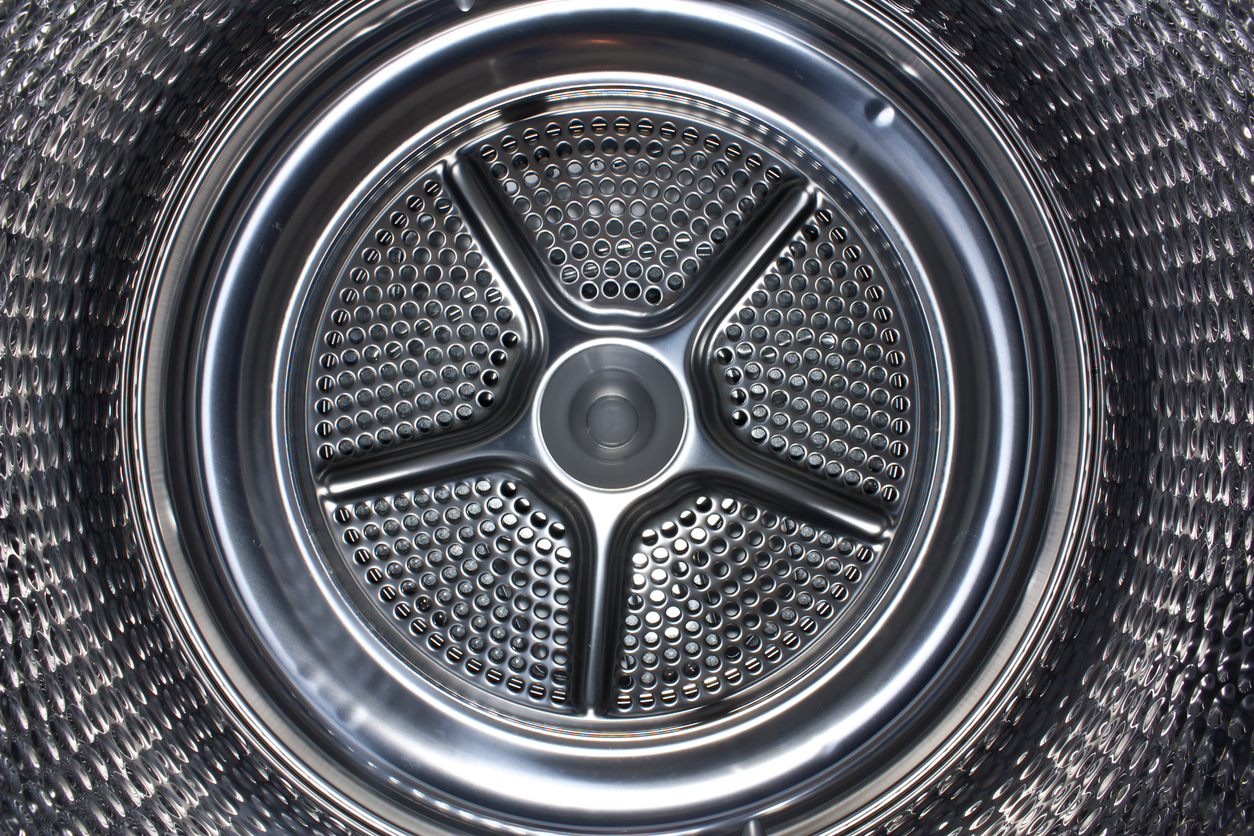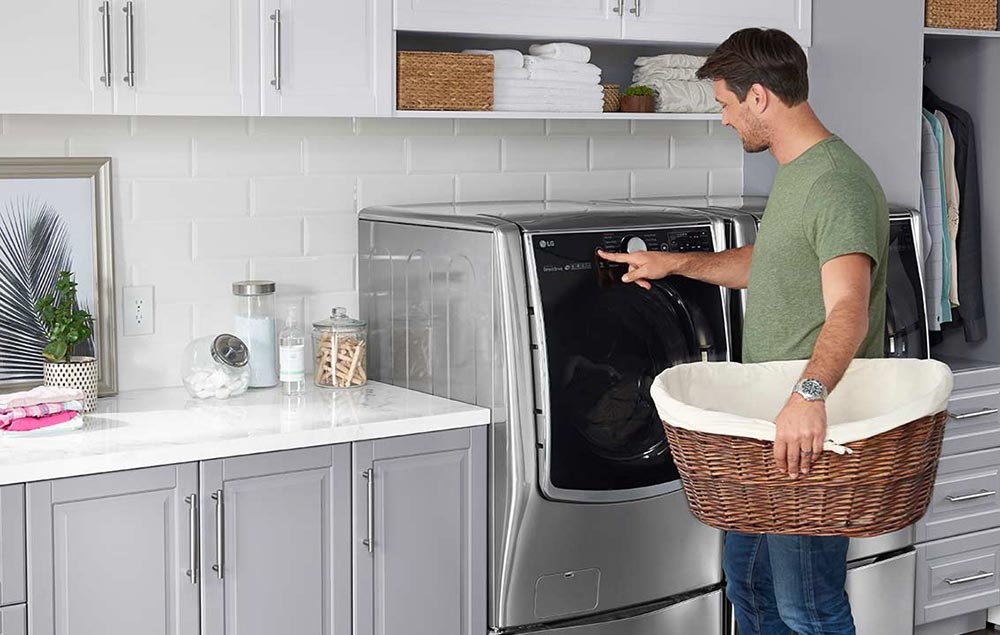From your everyday clothes to the throw pillows on your couch, it’s imperative that you properly care for the fabric items that make your world go ’round. That much can go without saying—but when it comes to the product specifications of your clothes dryer, there is more than meets the eye.
A major point of distinction within this appliance category is whether the dryer runs on natural gas or electricity, which brings us to today’s question: What's the difference between a gas and electric dryer? Well, to put it simply, gas dryers rely on a gas burner to generate heat whereas electric dryers use heating coils. But beyond that, these discrete sources of heat come with their own pros and cons.
Never ones to leave you high and dry, your friends in the business at Spencer’s TV & Appliance are here to uncover other differences between both heat sources in this gas vs. electric dryer showdown.

In This Corner: Gas Dryers
Aside from using gas burners to dry your clothes, towels, and home furnishings, gas dryers are primarily fueled by natural gas with some models operating on liquid propane. In addition, gas dryers are always vented—meaning, after the warmed air streams into the dryer’s tumbler and runs all over the whirling laundry, it needs to be expelled via an exterior vent.
Compared to electric models, dryers that run on natural gas get clothes dry faster, resulting in you spending less time in the laundry room. Because clothes are dried more quickly at specific temperatures to adequately evaporate water from the fabric, it is said that gas dryers are gentler on your laundry.
If your home is not already equipped with a gas-line connection, it can be expensive to install the necessary hookups. In some cases, your gas dryer can be powered by a large tank of liquid propane gas, as there are kits available to convert natural gas dryers to this source of power. Regardless of whether your laundry room has gas-line connections already in place, professional installation is recommended for gas dryers.
Although more expensive than electric dryers upon initial purchase, the operating cost for gas dryers is often half that that of electric models.
In the Other Corner: Electric Dryers
On the other hand, most electric dryers operate on a 240-volt outlet. This means you'll need a heavy-duty electrical outlet in the laundry room and specially designated breakers in your home’s electrical box to handle an electric dryer's energy needs. Visually speaking, most electric dryers are stocked with a large plug that has three or four prongs to fit the outlet.
In addition, most electric models need to be vented to the outside to expel the moisture generated from the hot air. Though scarce, pricier ventless dryers are available for purchase.
Another key difference between gas and electric dryers is the fact that the electric coils don’t run as hot as gas burners. Accordingly, electric dryers take longer to dry clothes because it takes more time to heat up the coils; however, an electric dryer is easier to install than a gas dryer—no technician necessary.
Typically, the purchase cost of an electric dryer is $50 and $100 less than a gas model manufactured by the same brand.

Gas Dryer vs. Electric Dryer: Our Premium Bestsellers
Now that we’ve covered the basics, let’s dive into our catalog! Featuring the Samsung 7.5 Cu. Ft. Front Load Gas Dryer (DVG45T6200W) and the LG 9.0 Cu. Ft. Front Load Electric Dryer (DLEX8100V), reference the following table for a side-by-side comparison of a gas dryer and electric dryer:
| Product Features |
|
| |
|---|---|---|---|
| Price (MSRP) | $1,049.00 | $1,499.00 | |
| Capacity (cu. ft.) | 7.5 | 9.0 | |
| Dimensions (in.) | 27 (W) x 38-3/4 (H) x 31-1/2 (D) | 29 (W) x 40-4/5 (H) x 32-1/10 (D) | |
| Voltage (V) | 120 | 240 | |
| Number of Cycles | 10 | 14 | |
| Number of Options | 9 | 11 | |
| Sensor Dry? | Yes | Yes | |
| Wrinkle Care Option? | Yes | Yes | |
| Steam Technology? | Yes | Yes | |
| Reversible Door? | Yes | Yes | |
| Smart Compatible? | No | No | |
| Vented or Ventless? | Vented | Vented | |
| Stackable? | Yes | No | |
| Drum Light? | Yes | Yes | |
| ENERGY STAR® Qualified? | Yes | No | |
Samsung 7.5 Cu. Ft. Front Load Gas Dryer
Designed to take the stress out of laundry day, the Samsung 7.5 Cu. Ft. Front Load Gas Dryer is brimming with convenient features. Among them: smart care for easy troubleshooting and sensor dry technology that automatically optimizes the time and temperature of your drying cycle to protect your garments from heat damage while avoiding excess energy use. You can also stop worrying about lint buildup blocking your dryer’s air intake, thanks to the Filter Check Indicator light that reminds you when it’s time to clean out the fluff.
Multi Steam technology has got you covered when you’re running late. Allowing you to multitask during busy mornings, this feature relaxes and smooths away wrinkles from everyday clothes, whether you’re looking to refresh your blouse for work or keep your children’s polyester uniforms looking sharp.
Best of all, this gas dryer from Samsung has a Steam Sanitize+ feature that eliminates 99.9 percent of germs and bacteria, over 95 percent of pollen (in time for spring), and 100 percent of dust mites.

LG 9.0 Cu. Ft. Front Load Electric Dryer
With an ultra-large capacity, the LG 9.0 Cu. Ft. Front Load Electric Dryer allows you to fit more for fewer loads, so you can spend more time doing the things you love. Including similar features as the Samsung DVG45T6200W dryer, this LG electric model also boasts a sensor dry feature, a wrinkle care option, interior drum light, and duct-clogging indicator.
In addition to reducing wrinkles on your clothes and linens, TurboSteam™ channels high-temperature air to eliminate odors and virtually eliminate the need to iron forevermore.
If that’s not enough, this electric dryer offers a sleek appearance with intelligent electronic controls with LED display, touch buttons, and a beautiful dial that allows you to set cycles. Quiet operation, remaining time display, and status indicators are other useful features you can expect from this top-rated LG product.

The Final Verdict
In the case of gas vs. electric dryers, your purchase of either one should depend on a mix of factors, which ultimately boil down to what you prioritize most.
Gas dryers are superior when it comes to prolonging the life of your clothing (due to their quicker cycles) and energy efficiency (due to their lower operating costs).
Meanwhile, electric dryers are typically preferred for their easy installation and more affordable price tag. Again, it's all about whatever floats your boat.
Let Us Help You
Be sure to browse our catalog of top-performing laundry appliances, and if you need help choosing between a gas or electric dryer, contact your friends in the business at Spencer’s TV & Appliance. Whether you call or visit us at any of our 10 Phoenix-area locations, we are always happy to help!


